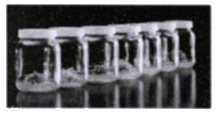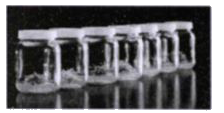In a culture, the bacteria count is 1,00,000. The number is increased by 10% in 2 hours. In how many hours will the count reach 2,00,000, if the rate of growth of bacteria is proportional to the number present?
Step by step video & image solution for In a culture, the bacteria count is 1,00,000. The number is increased by 10% in 2 hours. In how many hours will the count reach 2,00,000, if the rate of growth of bacteria is proportional to the number present? by Maths experts to help you in doubts & scoring excellent marks in Class 12 exams.
Updated on:21/07/2023Topper's Solved these Questions
- DIFFERENTIAL EQUATIONSBOOK - MODERN PUBLICATIONCHAPTER - DIFFERENTIAL EQUATIONSEXERCISE - NCERT - FILE (Questions from NCERT Book) (Exercise 9.5)
16 Videos
- DIFFERENTIAL EQUATIONSBOOK - MODERN PUBLICATIONCHAPTER - DIFFERENTIAL EQUATIONSEXERCISE - NCERT - FILE (Questions from NCERT Book) (Exercise 9.6)
19 Videos
- DIFFERENTIAL EQUATIONSBOOK - MODERN PUBLICATIONCHAPTER - DIFFERENTIAL EQUATIONSEXERCISE - NCERT - FILE (Questions from NCERT Book) (Exercise 9.3)
12 Videos
- DETERMINANTSBOOK - MODERN PUBLICATIONCHAPTER - DETERMINANTSEXERCISE - Chapter test 4
12 Videos
- INTEGRALSBOOK - MODERN PUBLICATIONCHAPTER - INTEGRALSEXERCISE - COMPETITION FILE
24 Videos
Similar Questions
In a culture the bacteria count is 100000. The number is increased by 10% in 2 hours. In how many hours will the count reach 200000, if the rate of growth of bacteria is proportional to the number present.
View SolutionThe rate of increase in the number of bacteria in a certain bacteria culture is proportional to the number present. Given the number triples in 5 hrs., find how many bacteria will be present after 10 hours. Also find the time necessary for the number of bacteria to be 10 times the number of initial present. [Given loge3=1.0986, e2.1972=9 ]
View Solution
Knowledge Check
The bacteria in a culture grows by 10% in the first hour, decreases by 10% in the second hour and again increases by 10% in the third hour. If the original count of the bacteria in a sample is 10000, find the bacteria count at the end of 3 hours.
A13310B10890C10990D11000The bacteria in a culture grows by 10% in the first hour, decreases by 10% in the second hour and again increases by 10% in the third hour. Find the bacteria at the end of 3 hours if the count was initially 20000.
A20967B21000C28890D21780Read the following text and answer the following questions on the basis of the same: The rate of increase in the number of bacteria in a certain bacteria culture is proportional to the number present. Given that the number triples in 5 hours.

If N0 is the initial count of bacteria, after 10 hours the count is __________ .A15log3B3logN0C9N0D2N0
In a certain experiment the count of bacteria was increasing at the rate of 2.5% per hour. Initially, the count was 5,12,000. Find the bacteria at the end of 2 hours.
View SolutionAn initial number of bacteria presented in a culture is 10000. This number doubles every 30 minutes. How long will it take to bacteria to reach the number 100000 ?
View SolutionThe bacteria in a culture grows by 10% in the first hour, decreases by 10% in the second hour and again increases by 10% in the third hour. If the original count of the bacteria in a sample is 10000, find the bacteria count at the end of 3 hours.
View SolutionIn a certain culture of bacteria, the rate of increase is proportional to the number present. If it is found that the number doubles in 4 hours, find the number of times the bacteria are increased in 12 hours.
View SolutionRead the following text and answer the following questions on the basis of the same: The rate of increase in the number of bacteria in a certain bacteria culture is proportional to the number present. Given that the number triples in 5 hours.

The bacteria becomes 10 times in ___________ hours.
View Solution
